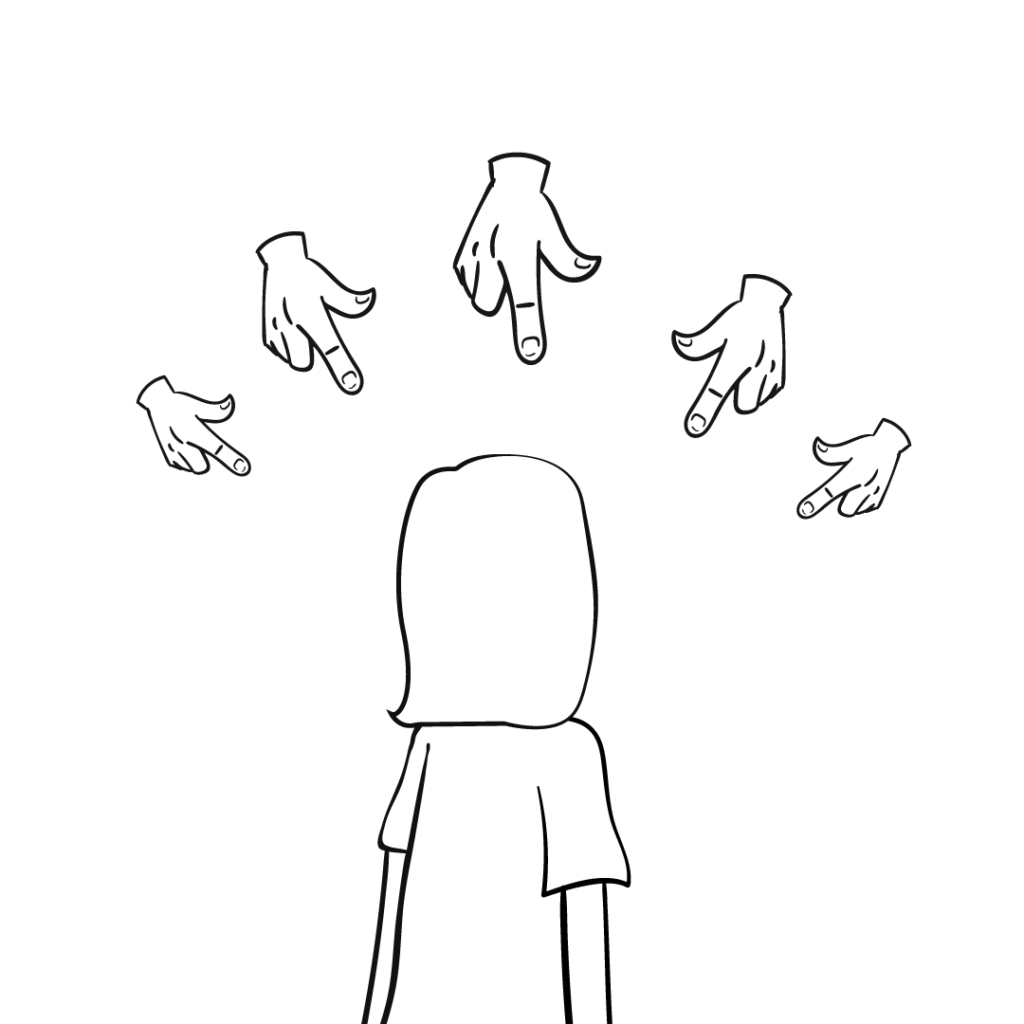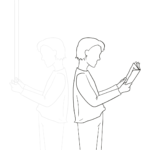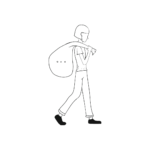SOCIAL INTEGRATION OF THE REPATRIATED
After returning to Kosovo, repatriated children didn’t find the right treatment in educational institutions to be integrated into society. A big problem was the fact that friends and the district where they lived and acted in started making fun of them by placing different nicknames or by not accepting them in the circle created inside and outside of school.
Illustration: Argjira Kukaj

Economic problems, lack of perspective and a high level of disappointment with Kosovar politics are counted as the main causes from a lot of Kosovar families who abandoned their country. Since after war, in the year 2014 Kosovo experienced the biggest migration wave that reached its peak in the beginning of 2015. More than 100 thousand people illegally crossed country borders, destined for the European Union, during a relatively short time period. According to a study realized in the year 2015 from “Econster” and the Leibniz Institute of Agricultural Development in Transition Economies (IAMO), it turns out that during that year and when the biggest migration wave hit, economic conditions weren’t the only reason of civilians’ migration, but the main reason was lack of perspective in our country.
“Some experts suggest that those who directly benefited from this exodus, namely traffickers and their cooperators, have contributed in sharing this motivational information. An example is the words spread in the Ferizaj region that Germany would automatically recognize the right of asylum seeking to all immigrants who would arrive in February 2015 “, it’s written in the report. Regardless, at the moment they passed into Western Europe, they went there with the thought that they’d be expecting a much better life there, oppositely to the life they had in their country. Few of those families got to start life from the beginning in those countries, and a lot of them returned. In a study published by the organization “Democracy for Development” this year, titled “Measurement and evaluation of repatriation politics: Politics based on testimony/proof to ensure stable reintegration”, the figures of returnees are shown.
“The phenomena of returning immigrants have been in constant increase, and this is also illustrated in the IOM study (International Organization for Migration) of the year 2005, where it is clearly presented that the number of returnees in the year 2013 was 46,223, while in the year 2015, this number was visibly increased to 65,540, and in 2016 this number was near 100,000. More than half of the returnees in 2016 were from Germany”, it’s written in the report.
But after returning, Kosovar society didn’t provide a good reception, a main victim of this phenomena were young boys and girls till the age of eighteen.
After returning to Kosovo, repatriated children didn’t find the right treatment in educational institutions to be integrated into society. A big problem was the fact that friends and the district where they lived and acted in started making fun of them by placing different nicknames or by not accepting them in the circle created inside and outside of school. Some young boys and girl think that institutions are some of the prime causes for leaving these children behind and returning them a year or more behind in school years. This maybe also became a cause for repatriated children today to not be part of different activities organized with a purpose of socializing.
Mehmet Ibrahimi is a young person from the city of Pristina who has faced the consequences of repatriation. His experience of returning hasn’t been good, and he’s needed time to find himself again in the midst of friends. Regardless, he sees a distinction in the approach toward repatriated people even in the place he lives in.
“There was never a direct harassment toward me, but I’ve heard of numerous cases of harassment from young people in other places”, said Ibrahim. According to him, the state hasn’t managed to do enough to find an easier way for those who have returned after leaving Kosovo.
“Institutions haven’t done anything for me to feel better, on the contrary they returned me two years back with younger generations”, Ibrahim said.
Ibrahim sees the solution for this problem in the wide informing of the population from the institutions’ side for the repatriated or to simply make Kosovo a better place for living so that people don’t feel bad when they return or better yet to not abandon the country at all.
Regardless, it’s not enough only for institutions to take initiatives for this issue, but also we as a society can make it so that we can create a suitable environment for a living where no one is prejudiced. And this can be done by making them feel comfortable in school and including these young boys and girls again in the social circle, make them feel comfortable in school and anywhere else.
About the author: Samir Selmani is an 18 years old boy from Ferizaj.
Resource Center –ATRC.



The site content writer includes a particular natural expertise to express undeniably high-quality topics. Reads the website page is undeniably great and you’ll discover without doubt many standard visitors. No wonder, while using decent content. In any circumstance, it was a joy to commit time on your website and study the fascinating content.